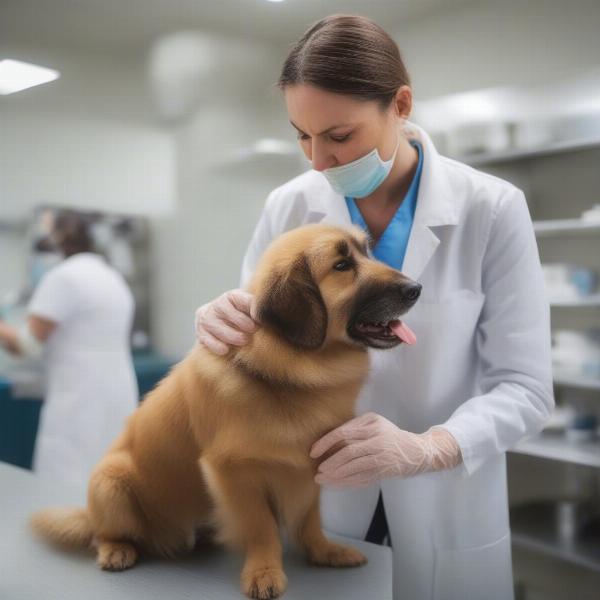Antimicrobial soap for dogs is a specialized cleaning product designed to kill or inhibit the growth of microorganisms like bacteria, fungi, and viruses on your dog’s skin and coat. Choosing the right antimicrobial soap can play a vital role in managing skin infections, preventing the spread of disease, and maintaining overall hygiene. But with so many options on the market, understanding how to select and use these soaps effectively is crucial for responsible pet owners.
Understanding Antimicrobial Soap for Dogs
Antimicrobial soaps for dogs are different from regular dog shampoos. While regular shampoos primarily focus on cleaning dirt and debris, antimicrobial soaps go a step further by targeting harmful microbes. These soaps are particularly helpful for dogs with skin conditions, allergies, or those prone to infections.
When to Use Antimicrobial Soap
Knowing when to use antimicrobial soap is just as important as choosing the right product. While beneficial in certain situations, overuse can disrupt the natural balance of your dog’s skin microbiome. Consider using antimicrobial soap in the following scenarios:
- Skin Infections: If your vet diagnoses a bacterial or fungal skin infection, they may recommend an antimicrobial soap to help manage the condition.
- Post-Surgery: Antimicrobial soap can help prevent infections in surgical sites as they heal.
- Exposure to Contaminated Environments: If your dog has been in an area with a high risk of infection, an antimicrobial soap can help reduce the chance of illness.
- Allergies: Some antimicrobial soaps can help soothe irritated skin associated with allergies.
Choosing the Right Antimicrobial Soap for Your Dog
Not all antimicrobial soaps are created equal. When selecting a product for your furry friend, consider the following factors:
- Ingredients: Look for soaps with active ingredients like chlorhexidine, benzoyl peroxide, or ketoconazole, which are effective against a broad spectrum of microorganisms. Avoid harsh chemicals that could irritate your dog’s skin.
- Your Dog’s Skin Type: If your dog has sensitive skin, opt for a hypoallergenic and fragrance-free formula.
- Vet Recommendations: Always consult your veterinarian before using any new product on your dog, especially if they have pre-existing skin conditions.
 Veterinarian Examining Dog's Skin
Veterinarian Examining Dog's Skin
Using Antimicrobial Soap Safely and Effectively
Using antimicrobial soap correctly is essential for maximizing its benefits and minimizing potential risks. Follow these guidelines for safe and effective use:
- Wet your dog’s coat thoroughly with lukewarm water.
- Apply the antimicrobial soap and lather gently, avoiding the eyes and ears.
- Allow the soap to sit on the coat for the recommended time, usually 5-10 minutes, as per your vet or the product instructions.
- Rinse thoroughly with lukewarm water until all traces of soap are removed.
- Dry your dog completely with a towel or hairdryer on a low setting.
Potential Side Effects
While generally safe, antimicrobial soaps can occasionally cause side effects such as skin dryness, redness, or itching. If you notice any of these symptoms, discontinue use and consult your vet. rubber mat for dog can be helpful to prevent your dog from slipping after a bath.
Maintaining Your Dog’s Hygiene
Antimicrobial soap is just one part of a comprehensive hygiene routine for your dog. Regular grooming, a healthy diet, and regular vet checkups are equally important for maintaining their overall health and well-being. An antiseptic cream dogs can also be helpful for minor cuts and scrapes.
Conclusion
Antimicrobial soap for dogs can be a valuable tool in managing skin infections and promoting hygiene. However, selecting the right product and using it correctly is crucial for achieving optimal results. Always consult your veterinarian before using any new soap on your dog and follow their guidance for safe and effective use. licking mat for dogs can provide a distraction during bath time.
FAQ
- How often should I use antimicrobial soap on my dog? Only use it as directed by your veterinarian or the product instructions. Overuse can disrupt your dog’s skin microbiome.
- Can I use human antimicrobial soap on my dog? No, human antimicrobial soaps are formulated differently and may contain ingredients that are harmful to dogs.
- What should I do if my dog experiences skin irritation after using antimicrobial soap? Discontinue use and consult your veterinarian.
- Are there natural alternatives to antimicrobial soap for dogs? Yes, some natural ingredients like oatmeal and aloe vera can have soothing and antimicrobial properties. Consult your vet for recommendations.
- Can I use antimicrobial soap on my puppy? Consult your veterinarian before using any antimicrobial soap on a puppy, as their skin is more sensitive.
- Is antimicrobial soap effective against all types of skin infections in dogs? No, different antimicrobial agents target different types of microorganisms. Your vet will recommend the appropriate soap based on your dog’s specific condition.
- Can antimicrobial soap help with dog odor? Some antimicrobial soaps can help control odor caused by bacteria or yeast overgrowth. Consider using a waterproof crate mats for dogs to maintain a clean environment.
ILM Dog is a leading international online resource dedicated to providing expert advice and guidance on all aspects of dog care and well-being. We offer valuable insights into breed selection, health and medical care, training and behavior, nutrition, grooming, and much more. From puppy care to senior dog care, ILM Dog is your trusted partner in navigating the joys and responsibilities of dog ownership. Contact us today to learn more about how we can help you provide the best possible care for your canine companion. Email: [email protected] Phone: +44 20-3965-8624. ILM Dog also offers a wide range of dog care products, such as chlorhexidine for dogs wipes, to help keep your furry friend healthy and happy.